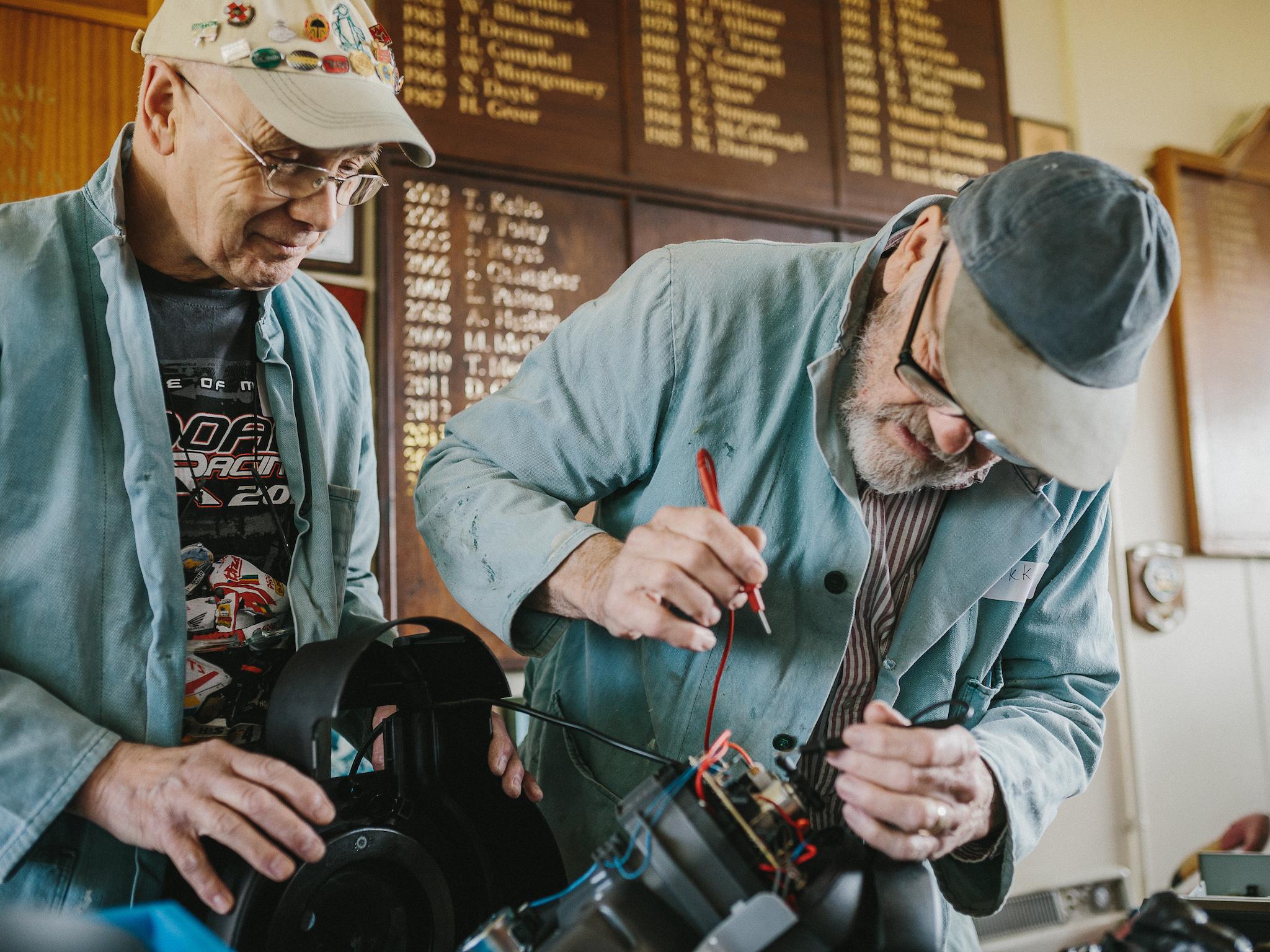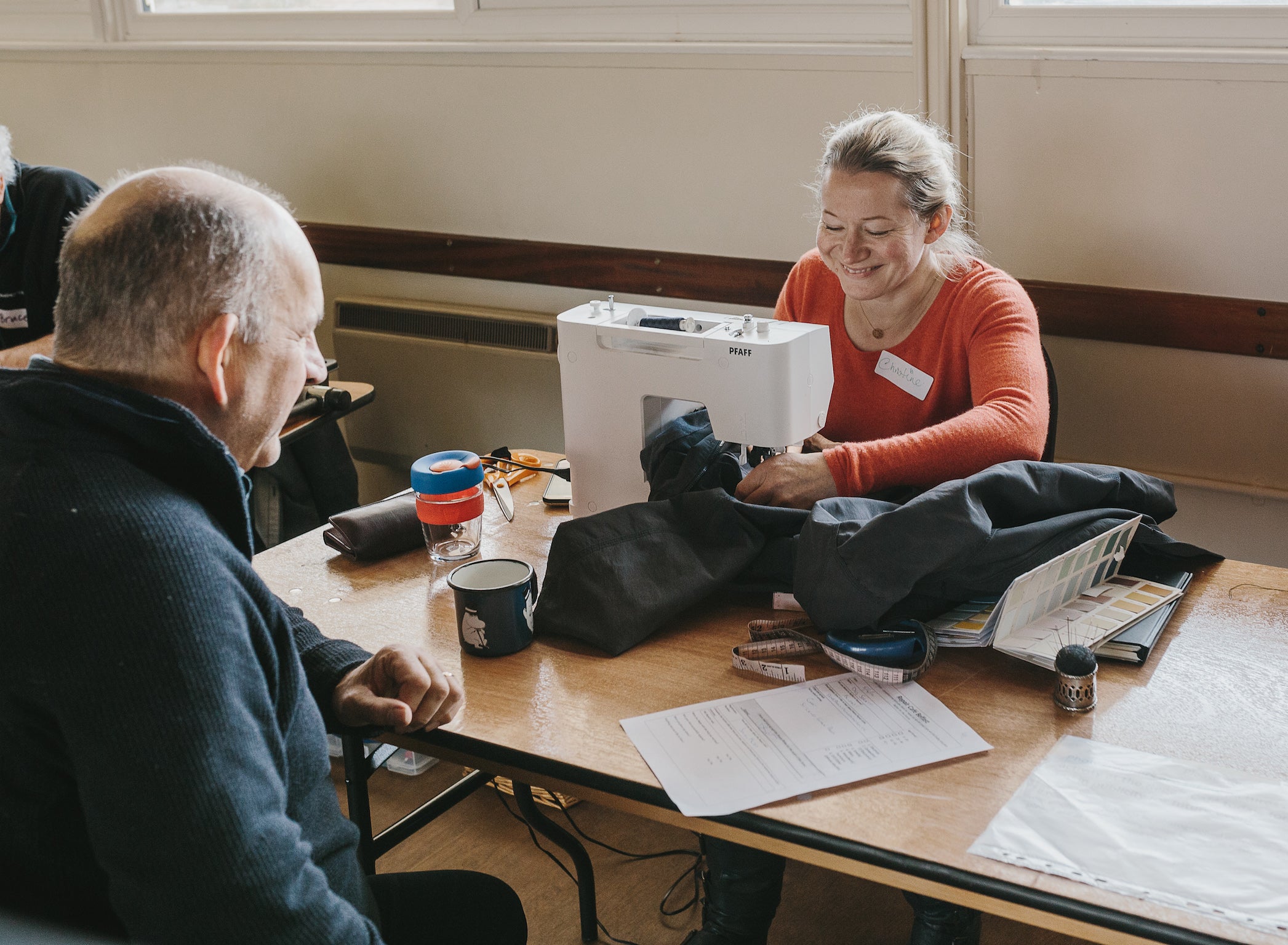Repair Cafe celebrates 10 years of fixing up instead of throwing out
What was started as a way to encourage people to learn how to take care of their belongings has evolved into a global movement against consumerism. Hazel Sheffield speaks to Martine Postma about how the cafes are challenging people’s behaviour

Lee Robb didn’t know you could get emotional about a toaster. But she still remembers the moment she watched a repairman bring a broken machine back to life.
It was at the first Repair Cafe that she set up with Chris McCartney in Belfast, and Robb was making tea for the volunteers who had given their time and skills to help fix people’s broken goods. One of the fixers thought that he had repaired a broken toaster, but he needed a piece of bread to check, so Robb ran and got one.
“Me, David and the people who brought the toaster watched it as it was toasting,” she remembers. “And then it popped up! I had no idea that I could feel emotional about a piece of bread that was being toasted. But there you have it!”
The Belfast cafe, founded in 2017, is one of 2,000 Repair Cafes in 35 countries around the world. The Repair Cafe Foundation, which celebrates its 10th anniversary in October, was started by former journalist Martine Postma as a way to encourage people to relearn how to take care of their belongings, rather than always throwing broken things away. It has evolved into a global movement against consumerism that has become ever more relevant as consumers have caught on to the need for sustainability to stave off the climate crisis.
“I think people deep down they realise that it’s not the normal way to throw a product away immediately when something is wrong,” Postma says. “People feel that it’s not right. There should be another way. Creating waste is not good and not sustainable.”

Postma started the first cafe in 2009. She felt frustrated reporting on sustainability and waste reduction as a journalist and wanted to do something more to challenge people’s behaviour. “I thought about it a lot,” she remembers. “Why do we create so much waste? Where does it come from?”
She landed on the simple idea that if we repaired more, we would waste less. But as soon as she started looking into mending goods, she realised that the whole economy had switched away from the principle of repair. “The infrastructure for buying new items is very sophisticated,” she says. “But there is hardly any infrastructure for repair left.”
Postma wanted to bring repairing back. She thought that for people to want to repair their goods more than to buy a new product, she would have to create an environment that was accessible, cheap and fun. “I didn’t want to do it in a workplace, but a meeting place, which is a fun experience for people to go.”
It was so much fun. People came in with bags of stuff – heavy objects or funny items. There was always something to talk about: why do you come here? What have you brought?
The first Repair Cafe was in Amsterdam in October 2009. Postma remembers it as a whirlwind of volunteers and broken stuff. She had put out a press call and the cafe was swamped by journalists who thought the idea made a great story. “It was so much fun,” she says. “People came in with bags of stuff – heavy objects or funny items. There was always something to talk about: why do you come here? What have you brought?”
Postma was so encouraged that she started the Repair Cafe Foundation and created kits to help other people start their own cafes. Initially, she hoped that a repair cafe might open in each of the 12 provinces in the Netherlands. She could never have imagined that in ten years it would spread all across the world.
Lee Robb started talking about a repair cafe in Northern Ireland after her friend Chris McCartney put out a call on social media for community-led responses to the climate emergency. This was October 2017 and deadly wildfires were ripping across northern Carolina in the US, and the World Health Organisation had reported that higher levels of carbon dioxide in the atmosphere was causing health issues for millions of people worldwide.
“Chris and I had some conversations about how to make it happen and we thought there were two tracks: we could establish an organisation, figure out our governance and health and safety, or we could just do it – so we decided to just do it.”
The friends partnered with a maker organisation that had a big workshop and put out a call on social media for the first cafe in December. The day came and the volunteers waited nervously in the workshop, wondering if anyone would brave it through the snow. A cheer went round when the first people arrived. As well as the toaster, someone had brought a tandem. Lots of people donated cakes and buns to a pay-as-you-feel cafe where people could sit and wait to see the fixers.
Since then the Belfast Repair Cafe has gathered around 60 volunteers for pop-up events around the city. Robb says they have repaired everything from lights, rollerboots, kids’ toys, clothes and appliances. “Half the stuff is electrical and that has the longest queue,” she says. The largest thing they have fixed is a petrol lawnmower in a former church hall. “When it was fixed and the cork was pulled 110 people cheered at the same time. It was an audible sense of something being repaired and the collective joy that followed!”
The Repair Cafe Foundation is evolving into a pressure organisation, gathering data on how to repair objects and encouraging manufacturers to make their goods repairable. But Postma, like Robb, keeps doing it for the human connections. She has collected many stories from people who come with products that might look like junk but mean the world to the owner. She gives the example of one elderly woman who came with a broken video recorder who just wanted to watch her wedding video again. “That’s why I am still doing it – because people are so happy when you repair something they care about.”
Join our commenting forum
Join thought-provoking conversations, follow other Independent readers and see their replies
Comments